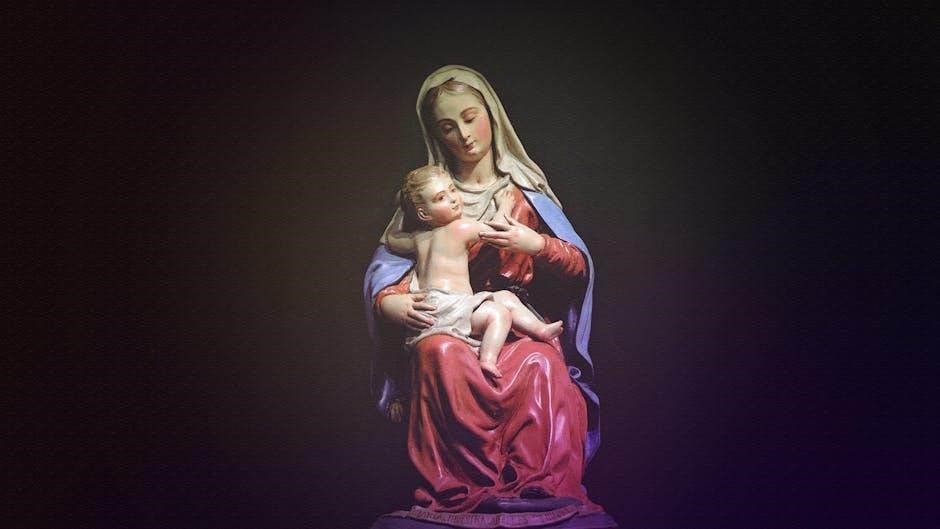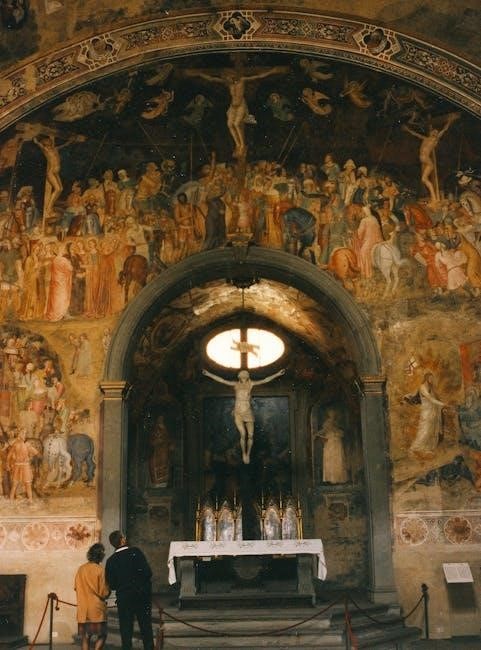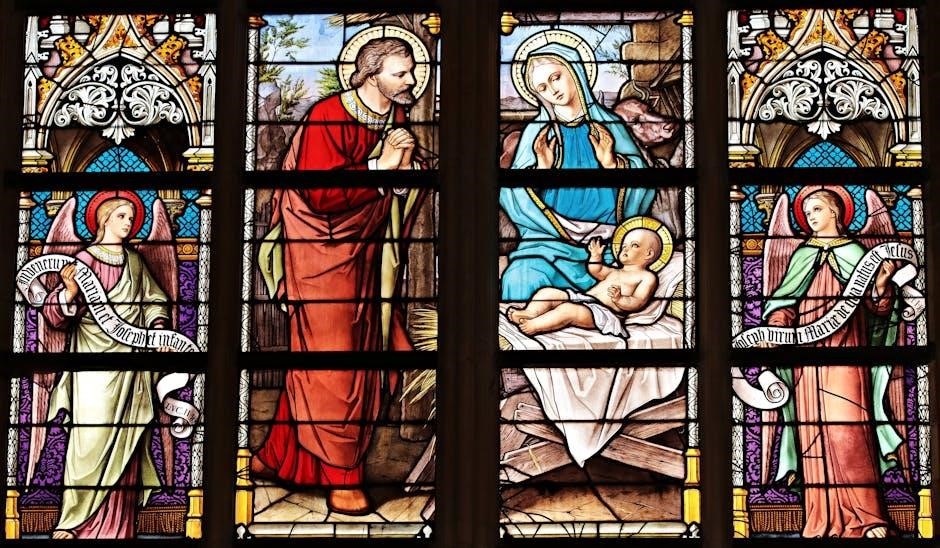prophecies jesus fulfilled pdf

The prophecies fulfilled by Jesus are a cornerstone of Christian faith, with over 300 ancient predictions uniquely realized in His life, death, and resurrection.

Overview of the Significance of Messianic Prophecies
Messianic prophecies are central to Christian theology, demonstrating God’s sovereignty and the reliability of Scripture. Over 300 specific predictions, such as Jesus’ birth in Bethlehem and His virgin birth, were fulfilled with precision. These prophecies, scattered across the Old Testament, highlight Jesus’ divine nature and mission. Their fulfillment strengthens faith, confirming Jesus as the Messiah and reinforcing the Bible’s authority; By examining these prophecies, believers gain deeper insight into God’s plan of redemption, showcasing Jesus’ life, death, and resurrection as the ultimate fulfillment of ancient promises.
The Number of Prophecies Fulfilled by Jesus
Bible scholars have identified over 300 prophecies fulfilled by Jesus, with some estimates ranging up to 400. These predictions, detailed in the Old Testament, cover every aspect of His life, from His birth in Bethlehem to His resurrection; The sheer number and specificity of these fulfilled prophecies underscore the uniqueness of Jesus’ mission and confirm His identity as the Messiah. This remarkable fulfillment of scripture serves as a powerful evidence of divine inspiration and reinforces the authenticity of the Bible’s message.

Prophecies About Jesus’ Birth
Jesus’ birth fulfilled specific prophecies, including His birthplace in Bethlehem (Micah 5:2), virgin birth (Isaiah 7:14), and being the seed of a woman (Genesis 3:15).
Birthplace in Bethlehem (Micah 5:2)
Micah 5:2 foretells that the Messiah would be born in Bethlehem, a small, insignificant town. This prophecy highlights God’s meticulous plan, as Bethlehem was the city of King David, linking Jesus to David’s lineage. The fulfillment is recorded in Matthew 2:1-6, where Joseph and Mary, complying with a Roman census, traveled to Bethlehem, ensuring Jesus’ birth there. This precise detail underscores the supernatural orchestration of Jesus’ arrival, aligning with God’s sovereign plan. The prophecy’s specificity and fulfillment affirm Jesus’ divine identity and validate His role as the Messiah, emphasizing the theological depth of His birthplace.
Virgin Birth (Isaiah 7:14)
Isaiah 7:14 prophesies that the Messiah would be born of a virgin, a miraculous and unprecedented event. This prophecy is fulfilled in Jesus’ birth, as recorded in Matthew 1:22-23 and Luke 1:26-31. The virgin birth signifies Jesus’ divine nature, emphasizing His supernatural origin and distinguishing Him as the Son of God. This unique aspect of His birth underscores God’s sovereign plan and the theological depth of His identity as the Messiah. The fulfillment of this prophecy is a cornerstone of Christian faith, highlighting the extraordinary nature of Jesus’ arrival and His mission to redeem humanity from sin. This truth remains central to understanding Jesus’ divine identity and purpose.
Seed of a Woman (Genesis 3:15)
Genesis 3:15 introduces the first Messianic prophecy, foretelling enmity between the serpent and the woman’s seed. Jesus, born of a virgin, embodies this prophecy, defeating Satan through His death and resurrection. This seed of the woman symbolizes Jesus’ divine mission to redeem humanity from sin, fulfilling God’s promise of salvation. The prophecy underscores Jesus’ unique identity as both fully human and fully divine, highlighting His role as the ultimate victor over evil. This foundational prophecy is fulfilled in Jesus, showcasing God’s sovereign plan to restore humanity through His Son. Galatians 4:4 and Matthew 1:21 confirm this fulfillment.

Prophecies About Jesus’ Ministry
Jesus’ ministry was foretold in the Old Testament, highlighting His role as a light to the Gentiles, healer of the sick, and teacher in parables, fulfilling divine prophecies.
Light to the Gentiles (Isaiah 42:6)
Isaiah prophesied that the Messiah would be a light to the Gentiles, bringing salvation to all nations. Jesus fulfilled this by ministering to non-Jews, demonstrating God’s universal love. His teachings, miracles, and interactions with Gentiles, like the Samaritan woman and the centurion, showcased His divine mission. The Great Commission further emphasized this prophecy, as Jesus commanded His disciples to spread the Gospel globally. Luke 2:32 and Acts 13:47 confirm this fulfillment, highlighting Jesus’ role as the light destined for both Israel and the world, embodying God’s plan to unite humanity under one Savior.
Healing the Sick (Isaiah 53:4)
Isaiah 53:4 foretells that the Messiah would bear the infirmities and sorrows of humanity, a prophecy fulfilled in Jesus’ healing ministry. Jesus miraculously restored sight to the blind, cured lepers, and healed countless others, demonstrating His divine power and compassion. Matthew 8:16-17 explicitly links these miracles to Isaiah’s prophecy, showcasing Jesus as the suffering Servant who bore the weight of human suffering. This fulfillment highlights Jesus’ divine nature and His mission to restore both spiritual and physical wholeness, reinforcing faith in His messiahship and the profound love of God for humanity.
Teaching in Parables (Psalms 78:2)
Psalm 78:2 foretells that the Messiah would speak in parables, a prophecy fulfilled as Jesus taught using parabolic stories. Matthew 13:34-35 confirms that Jesus’ teaching style mirrored this prophecy, using parables to convey spiritual truths. This method not only aligned with God’s plan but also ensured that His message reached hearts prepared to understand. By fulfilling this prophecy, Jesus demonstrated His role as the fulfiller of Scripture, deepening the connection between His ministry and the Old Testament promises. This unique teaching approach remains a testament to His divine wisdom and purposeful fulfillment of prophecy;

Prophecies About Jesus’ Death and Resurrection
Jesus’ crucifixion, resurrection, and burial were foretold in the Old Testament, with precise details like His death with thieves (Isaiah 53:9) and rising from the dead (Psalms 16:8-11).
Crucifixion with Thieves (Isaiah 53:9)
Isaiah 53:9 prophesied that the Messiah would be crucified alongside thieves, a fulfillment uniquely realized in Jesus’ death. Roman executioners nailed Him between two criminals, as foretold. This act symbolized His identification with sinners, emphasizing His mission to bear humanity’s guilt. The prophecy also highlighted His burial in a rich man’s tomb, underscoring God’s sovereignty even in death. Jesus’ crucifixion with thieves demonstrated His willingness to endure shame and suffering for redemption, fulfilling Isaiah’s words precisely. This event remains a cornerstone of Christian theology, showcasing divine fulfillment of ancient prophecy.
Resurrection from the Dead (Psalms 16:8-11)
Psalms 16:8-11 prophesies the Messiah’s resurrection, declaring His soul would not see corruption nor His body decay. Jesus fulfilled this by rising from the dead on the third day, as recorded in Acts 2:24-28. His resurrection validated His divine nature and triumph over sin, offering eternal hope to humanity. This prophecy underscores God’s faithfulness and the central tenet of Christian belief. The resurrection is a testament to Jesus’ power over death, fulfilling David’s ancient words and securing redemption for all people. This event is a pivotal moment in human history, affirming Jesus as the Messiah.
Burial in a Rich Man’s Tomb (Isaiah 53:9)
Isaiah 53:9 foretells that the Messiah would be buried in a rich man’s tomb, a detail fulfilled when Joseph of Arimathea, a wealthy follower, donated his own tomb for Jesus’ burial. This prophecy highlights God’s meticulous plan, as Jesus’ burial in a noble tomb symbolized His dignity and divine purpose. The fulfillment of this prophecy underscores the accuracy of Scripture and confirms Jesus’ identity as the Messiah. It also reflects the unexpected kindness of a stranger, further illustrating God’s sovereignty over even the smallest details of Jesus’ life and death.

Prophecies About Jesus’ Divine Nature
The prophecies about Jesus’ divine nature reveal Him as the Son of God and Creator of heaven and earth, fulfilling Psalms 2:7 and 102:25-27, confirming His eternal identity and mission.
Declared Son of God (Psalms 2:7)
The prophecy in Psalms 2:7 declares, “You are My Son; today I have begotten You,” which is fulfilled in Jesus. At His baptism, the Father affirmed, “This is My beloved Son” (Matthew 3:17), and on the Mount of Transfiguration, He repeated, “This is My beloved Son” (Matthew 17:5). This divine declaration establishes Jesus’ unique relationship with God, confirming His divine nature and authority. The fulfillment of this prophecy underscores Jesus’ role as the Messiah and Savior, aligning with Old Testament expectations of the Son of God.

Creator of Heaven and Earth (Psalms 102:25-27)
Psalms 102:25-27 prophesies, “Of old You laid the foundation of the earth, and the heavens are the work of Your hands. They will perish, but You will endure… You are the same.” This passage Points to the eternal nature of the Creator. Jesus fulfilled this prophecy as the divine Creator, evident in John 1:3, which states, “All things were made through Him.” Colossians 1:16 further affirms, “By Him all things were created.” This prophecy highlights Jesus’ role in creation, reinforcing His divine identity and eternal nature, thus strengthening faith in His sovereignty and redemptive mission.
Priest of the Order of Melchizedek (Psalms 110:4)
Psalms 110:4 declares, “You are a priest forever after the order of Melchizedek.” This prophecy is fulfilled in Jesus, who serves as both King and Priest. Unlike the Levitical priesthood, which was limited by lineage, Jesus’ priesthood is eternal and divine. Hebrews 5:6 and Hebrews 7:17 confirm this, stating He is “a priest forever after the order of Melchizedek.” This unique priesthood underscores Jesus’ role in offering a once-for-all sacrifice for sin, providing unparalleled access to God and establishing a new covenant through His divine authority. This fulfillment highlights His eternal and supreme priesthood.

Prophecies About Jesus’ Second Coming
Jesus’ second coming is foretold in prophecies like Isaiah 11:12, which speaks of Israel’s restoration, and Daniel 7:13-14, highlighting His eternal reign and divine authority.
Restoration of Israel (Isaiah 11:12)
The prophecy in Isaiah 11:12 foretells the restoration of Israel, where God will gather His people from the nations. This event is tied to Jesus’ second coming, fulfilling His promise to reign over a redeemed Israel. The prophecy symbolizes unity and peace, with Israel living under divine blessings. It highlights God’s faithfulness to His covenant people and serves as a beacon of hope for believers awaiting Jesus’ triumphant return. This restoration is a key aspect of Messianic prophecy, showcasing Jesus as the ultimate ruler of a renewed world order;

Final Judgment (Psalms 2:9)
Psalms 2:9 prophesies that the Messiah will rule the nations with an iron rod, a vivid imagery of divine authority. This prophecy is fulfilled in Jesus, who will execute God’s judgment over all humanity. At His second coming, Jesus will separate the righteous from the wicked, as described in Matthew 25:31-46. This judgment emphasizes His divine sovereignty and the ultimate accountability of all people. The prophecy underscores the dual nature of Jesus as both Savior and Judge, urging believers to live in readiness and faith, knowing His return will bring eternal consequences for all mankind.
Eternal Reign (Daniel 7:13-14)
Daniel 7:13-14 prophesies the Messiah’s eternal reign, where He receives dominion, glory, and a kingdom that will never end. This prophecy is fulfilled in Jesus, who is described as the Son of Man in the New Testament. At His ascension, Jesus was exalted to the throne of heaven, and His reign continues forever (Revelation 11:15). This prophecy emphasizes Jesus’ divine sovereignty and the eternal nature of His kingdom. It also serves as a source of hope for believers, knowing that Jesus will ultimately reign over all creation in righteousness and peace (1 Corinthians 15:24-25).
The fulfillment of over 300 prophecies underscores Jesus’ divine mission, providing historical and theological validation and strengthening faith in His redemptive purpose.
The Historical and Theological Significance of Fulfilled Prophecies
The fulfillment of prophecies by Jesus holds profound historical and theological significance, authenticating His divine mission and validating the unity of God’s redemptive plan. These prophecies, spanning centuries, demonstrate God’s sovereignty and foresight, bridging the Old and New Testaments. They provide a robust apologetic, confirming Jesus as the Messiah and deepening faith. The precise and detailed nature of these predictions highlights their impossibility by chance, underscoring divine authorship. This validation reinforces the integrity of Scripture and the uniqueness of Christ’s role in salvation history, offering a compelling foundation for Christian belief and understanding.
How Fulfilled Prophecies Strengthen Faith in Jesus
Fulfilled prophecies powerfully reinforce faith in Jesus by demonstrating the credibility of Scripture and the divine orchestration of history. The precise and detailed nature of these predictions, often made centuries in advance, underscores the supernatural origin of the Bible. Seeing how Jesus’ life, death, and resurrection align perfectly with these ancient forecasts deepens believers’ trust in God’s plan and Jesus’ identity as the Messiah. This alignment provides tangible evidence of His divine mission, offering a solid foundation for faith and assuring believers of the reliability of God’s promises, both in Scripture and in their personal lives.

Downloadable PDF Resource
Access a detailed PDF chart listing over 300 Old Testament prophecies fulfilled by Jesus, offering a comprehensive reference for study and sharing with others.
Access a Comprehensive Chart of Fulfilled Prophecies
Download a detailed PDF chart that outlines over 300 Old Testament prophecies fulfilled by Jesus Christ. This resource provides a chronological and thematic breakdown of Messianic predictions, including their scriptural references and New Testament fulfillments. Perfect for personal study or sharing with others, the chart highlights key events such as Jesus’ birth in Bethlehem, His virgin birth, crucifixion, resurrection, and more. It serves as a powerful tool to strengthen faith and deepen understanding of God’s plan revealed through prophecy. Easily accessible and shareable, this PDF is an invaluable resource for believers and scholars alike.
Further Study Materials on Messianic Prophecies
Explore in-depth resources and study materials on Messianic prophecies to deepen your understanding of Jesus’ fulfillment of Scripture. Downloadable PDFs, eBooks, and articles provide detailed analyses of Old Testament predictions and their New Testament fulfillments. These materials include verse-by-verse explanations, historical context, and theological insights, helping believers connect the biblical narrative. Many resources also offer practical applications for personal reflection or group study, enabling a richer faith journey. Utilize these tools to uncover the profound significance of Messianic prophecies and their role in confirming Jesus as the Messiah.